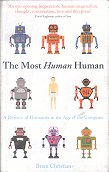By mimicking our conversation and behaviour, computers have recently come within a single vote of passing the Turing Test, the widely accepted threshold at which a machine can be said to be ‘thinking’ or ‘intelligent’. In this witty, wide-ranging and inspiring investigation, Brian Christian takes the recent and breathtaking advances in artificial intelligence as the opportunity to rethink what it means to be human, and what it means to be intelligent, in the twenty-first century.
Competing head-to-head with the world’s leading AI programs at the annual Turing Test competition, he uses their astonishing achievements as well as their equally fascinating failings to reveal our most human abilities: to learn, to communicate, to intuit and to understand. And in an age when computers may be steering us away from these activities, he shows us how to become the most human humans that we can be.
Drawing on science, philosophy, literature and the arts, and touching on aspects of life as diverse as language, work, school, chess, speed-dating, art, video games, psychiatry and the law, The Most Human Human shows that, far from being a threat to our humanity, computers provide a better means than ever before of understanding what it is.

